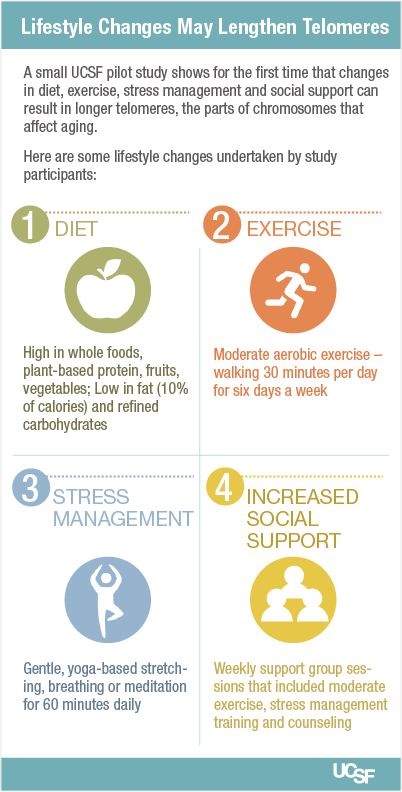A small pilot study shows for the first time that changes in diet, exercise, stress management and social support may result in longer telomeres, the parts of chromosomes that affect aging.
It is the first controlled trial to show that any intervention might lengthen telomeres over time.

The study was published online on Sept. 16 in The Lancet Oncology.
The study was conducted by scientists at UC San Francisco and the Preventive Medicine Research Institute, a nonprofit public research institute in Sausalito, Calif. that investigates the effect of diet and lifestyle choices on health and disease. The researchers say they hope the results will inspire larger trials to test the validity of the findings.
‘Our genes, and our telomeres, are not necessarily our fate,’ said lead author Dean Ornish, MD, UCSF clinical professor of medicine, and founder and president of the Preventive Medicine Research Institute.
‘So often people think ‘Oh, I have bad genes, there’s nothing I can do about it,’’ Ornish said. ‘But these findings indicate that telomeres may lengthen to the degree that people change how they live. Research indicates that longer telomeres are associated with fewer illnesses and longer life.’
Telomeres are the protective caps on the ends of chromosomes that affect how quickly cells age. They are combinations of DNA and protein that protect the ends of chromosomes and help them remain stable. As they become shorter, and as their structural integrity weakens, the cells age and die quicker.
In recent years, shorter telomeres have become associated with a broad range of aging-related diseases, including many forms of cancer, stroke, vascular dementia, cardiovascular disease, obesity, osteoporosis and diabetes. Here’s an infographic courtesy of UCSF that illustrates the lifestyle shown to reverse ageing in the study:
For five years, the researchers followed 35 men with localized, early-stage prostate cancer to explore the relationship between comprehensive lifestyle changes, and telomere length and telomerase activity. All the men were engaged in active surveillance, which involves closely monitoring a patient’s condition through screening and biopsies.
Ten of the patients embarked on lifestyle changes that included: a plant-based diet (high in fruits, vegetables and unrefined grains, and low in fat and refined carbohydrates); moderate exercise (walking 30 minutes a day, six days a week); stress reduction (gentle yoga-based stretching, breathing, meditation). They also participated in weekly group support.
They were compared to the other 25 study participants who were not asked to make major lifestyle changes.
The group that made the lifestyle changes experienced an increase in telomere length of approximately 10 percent. Further, the more people changed their behavior by adhering to the recommended lifestyle program, the more dramatic their improvements in telomere length, the scientists learned.
By contrast, the men in the control group who were not asked to alter their lifestyle had measurably shorter telomeres – nearly three percent shorter – when the five-year study ended. Telomere length usually decreases over time.
The researchers say the findings may not be limited to men with prostate cancer, and are likely to be relevant to the general population.
‘We looked at telomeres in the participants’ blood, not their prostate tissue,’ said Ornish.
The new study is a follow up to a similar, three-month pilot investigation in 2008 in which the same participants were asked to follow the same lifestyle program. After three months, the men in the initial study exhibited significantly increased telomerase activity. Telomerase is an enzyme that repairs and lengthens telomeres.
What British experts say
Dr Lyn Cox, a biochemistry expert at Oxford University said it was not possible to draw any strong conclusions from the research but told the BBC: ‘Overall, the findings of this paper that changes in lifestyle can have a positive effect on the markers of ageing support the call for healthier lifestyles.’
But it’s important to note that this was only a small pilot study, said Dr Tom Vuillamy, senior lecturer in Molecular Biology at Queen Mary University of London. ‘I am going to wait and see whether this can be replicated on a larger scale before I get excited.
‘But past work has shown people with sedentary lifestyles can experience accelerated ageing in the form of more rapid shortening of their telomeres.’
Find out more and see a video of Dr Ornish talking about the research
Like this article? Sign up to our newsletter to get more articles like this delivered straight to your inbox.





















































